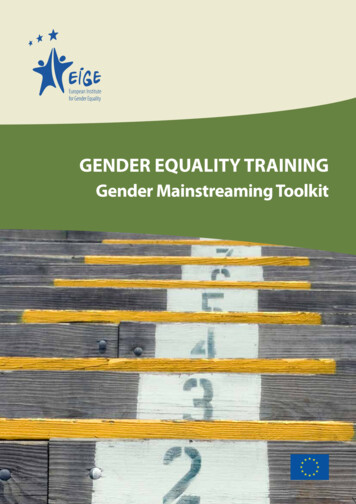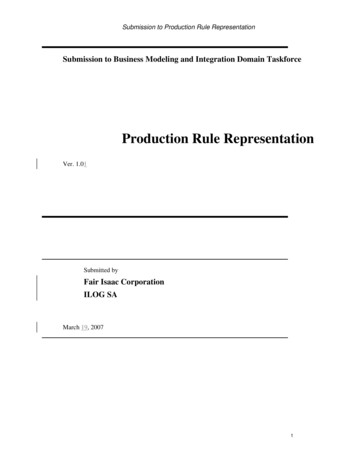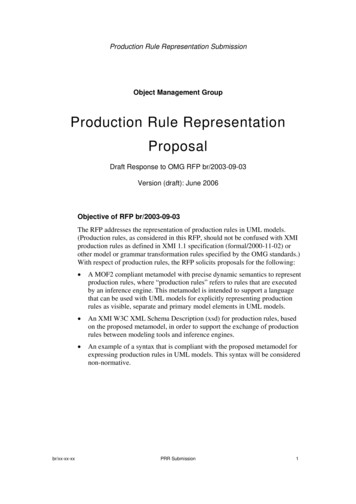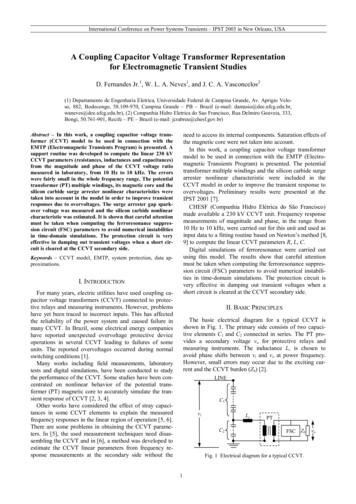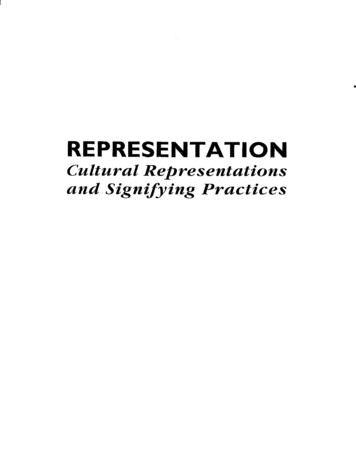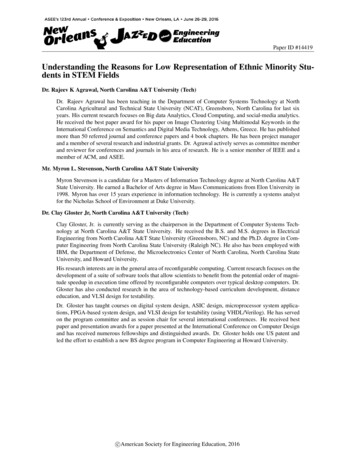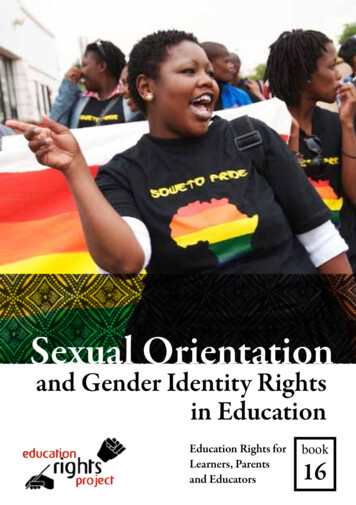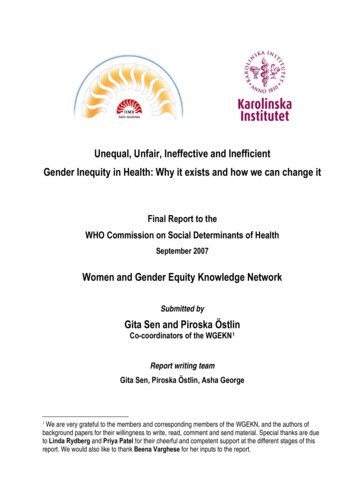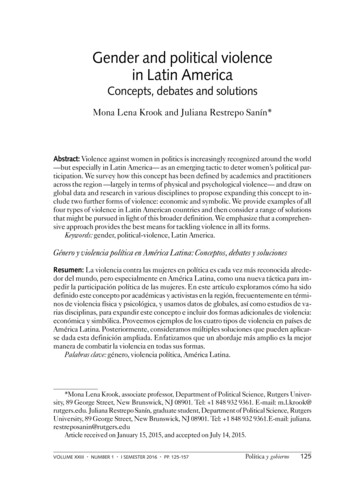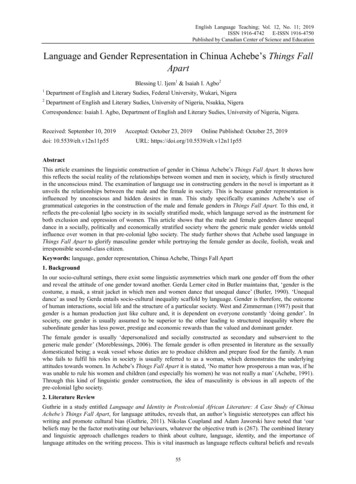
Transcription
English Language Teaching; Vol. 12, No. 11; 2019ISSN 1916-4742E-ISSN 1916-4750Published by Canadian Center of Science and EducationLanguage and Gender Representation in Chinua Achebe’s Things FallApartBlessing U. Ijem1 & Isaiah I. Agbo21Department of English and Literary Sudies, Federal University, Wukari, Nigera2Department of English and Literary Sudies, University of Nigeria, Nsukka, NigeraCorrespondence: Isaiah I. Agbo, Department of English and Literary Sudies, University of Nigeria, Nigera.Received: September 10, 2019doi: 10.5539/elt.v12n11p55Accepted: October 23, 2019Online Published: October 25, 2019URL: https://doi.org/10.5539/elt.v12n11p55AbstractThis article examines the linguistic construction of gender in Chinua Achebe’s Things Fall Apart. It shows howthis reflects the social reality of the relationships between women and men in society, which is firstly structuredin the unconscious mind. The examination of language use in constructing genders in the novel is important as itunveils the relationships between the male and the female in society. This is because gender representation isinfluenced by unconscious and hidden desires in man. This study specifically examines Achebe’s use ofgrammatical categories in the construction of the male and female genders in Things Fall Apart. To this end, itreflects the pre-colonial Igbo society in its socially stratified mode, which language served as the instrument forboth exclusion and oppression of women. This article shows that the male and female genders dance unequaldance in a socially, politically and economically stratified society where the generic male gender wields untoldinfluence over women in that pre-colonial Igbo society. The study further shows that Achebe used language inThings Fall Apart to glorify masculine gender while portraying the female gender as docile, foolish, weak andirresponsible second-class citizen.Keywords: language, gender representation, Chinua Achebe, Things Fall Apart1. BackgroundIn our socio-cultural settings, there exist some linguistic asymmetries which mark one gender off from the otherand reveal the attitude of one gender toward another. Gerda Lerner cited in Butler maintains that, ‘gender is thecostume, a mask, a strait jacket in which men and women dance that unequal dance’ (Butler, 1990). ‘Unequaldance’ as used by Gerda entails socio-cultural inequality scaffold by language. Gender is therefore, the outcomeof human interactions, social life and the structure of a particular society. West and Zimmerman (1987) posit thatgender is a human production just like culture and, it is dependent on everyone constantly ‘doing gender’. Insociety, one gender is usually assumed to be superior to the other leading to structured inequality where thesubordinate gender has less power, prestige and economic rewards than the valued and dominant gender.The female gender is usually ‘depersonalized and socially constructed as secondary and subservient to thegeneric male gender’ (Moreblessings, 2006). The female gender is often presented in literature as the sexuallydomesticated being; a weak vessel whose duties are to produce children and prepare food for the family. A manwho fails to fulfil his roles in society is usually referred to as a woman, which demonstrates the underlyingattitudes towards women. In Achebe’s Things Fall Apart it is stated, ‘No matter how prosperous a man was, if hewas unable to rule his women and children (and especially his women) he was not really a man’ (Achebe, 1991).Through this kind of linguistic gender construction, the idea of masculinity is obvious in all aspects of thepre-colonial Igbo society.2. Literature ReviewGuthrie in a study entitled Language and Identity in Postcolonial African Literature: A Case Study of ChinuaAchebe’s Things Fall Apart, for language attitudes, reveals that, an author’s linguistic stereotypes can affect hiswriting and promote cultural bias (Guthrie, 2011). Nikolas Coupland and Adam Jaworski have noted that ‘ourbeliefs may be the factor motivating our behaviours, whatever the objective truth is (267). The combined literaryand linguistic approach challenges readers to think about culture, language, identity, and the importance oflanguage attitudes on the writing process. This is vital inasmuch as language reflects cultural beliefs and reveals55
elt.ccsenet.orgEnglish Language TeachingVol. 12, No. 11; 2019what goes on in the mind. The choices regarding vocabulary and grammar in a literary text are both consciouslyand unconsciously ‘principled and systematic’, (Fowler et al., 188), thus requiring a critical examination of thethought processes and patterns.Commenting on the construction of male and female genders in the autobiographical narratives, Ogunyemi et almaintain that gender differences are created and sustained by society through its traditional machinery, such asits conventions, norms, institutions and laws (99). The idea about male and female as it has to do with genderinclude traditional views that mark ‘women as submissive, illogical, passive, talkative, emotional, easily given totears, etc. Men on the other hand are assumed to be competent, logical and independent.” (Behringer, 2008). Asocial constructionist view of gender looks beyond categories and examines the intersections of multipleidentities and the blurring of the boundaries between essentialist categories. This is especially true with regard tocategories of male and female, which are viewed typically as binary and opposite.One of the primary means in the expression of gender is speech. This is in tandem with Duranti’s belief thatlanguage can do things beyond the performative functions of verbs such as promise, pronounce and apologize(458). He states that some linguistic features can index, or point to a connection between a person and a place ora profession. In addition, he points out that the pronoun (he, she) which indexes a person’s gender can affect theway the person is perceived. Parker and Sedgwick argue that performativity makes it possible for an in-depthappreciation of the ways identities are constructed in texts (2), just as Renzetti and Curran has maintained thatthe moment parents are asked to describe their 24 hours old infants, parents do so using gender-stereotypiclanguage: boys are described as strong, alert and coordinated while girls are described as tiny, soft and delicate(Renzetti & Curran, 1992). It has also been observed that there are a lot of linguistic resources and embodiedperformances that express gendered meaning such as pitch, intensity, and loudness (Smyth et al., 2003). Sapiralso holds that ‘language is the medium of literature just as marble, bronze or clay are materials of sculpture’(222). In literature, language is employed in the construction of gender types and roles of each gender type isdescribed using language and linguistic resources that mirror unbalances view of the male and female genders.Other researchers such as Baxter (2003), Kiesling (1997, 2003), Pujolar (2000) and some discursivepsychologists such as Edley and Wetherell (1997) and Speer (2002) have focused ‘on the diversity of genderedlinguistic performance produced in different local contexts by single individuals or small groups’ (Cameroon,2005). They studied the way their subjects, instead of occupying a consistent gendered position, seem to orient toand/or be positioned by others through a continually shifting range of discourses on masculinity and femininity.It has been noted that men represent themselves in text and talk as responsible and professionally successfulpeople but in some contexts, discussion of women is crudely objectifying, sexist and implicitly homophobic.This shows that some range of gendered performances can be found in the repertoire of every group, and indeedevery individual subject in society.Although gender is interpreted as a social construct, it has the capacity to influence the experiences of the people.It could be argued then that gender structures interaction opportunities, consciousness, ideology and the forms ofresistance that characterize the life of a people. Gender refers to roles, attributes and values assigned by cultureand society to women and men. It is “the socially constructed roles of and relations between males and females”(Zola, 2010). Gender is often marked by unequal power relations that assign definite entitlements andresponsibilities to men only. This leads to the emergence of gender sensitivity, a situation whereby peoplebecome aware of what others think about gender to challenge the orthodox views and assumptions of the roles ofmen and women in society. Gender sensitivity neutralizes the patriarchal status quo where ‘men have socialpower in every important structure of society and women do not have any real access to such structures’ (Zola,2010). Gender sensitivity pays a great deal of attention to the various similarities and differences between menand women with respect to their experiences and viewpoints. Gender sensitivity is committed to giving equalvalue and opportunity to both men and women in society. In other words, it has to do with the awareness and theappreciation of the need to maintain at a reasonable level, the gender difference between the man and female.In Nigeria, for instance, there is gender profiling which points at gender imbalance, gender inequality, genderbias and gender discrimination and they manifest in literature. The interpretation of the above assertion is thatmales are favoured and treated preferentially to the detriment of their female counterparts in literary works suchas Chinua Achebe’s Things Fall Apart which is a reflection of the goings on in society. In the third worldcountries, men dominate virtually every aspect of governance and use their position and status to accumulatepower and wealth. In Igbo culture for example, decision making has remained the prerogative of the masculinegender that is fondly called “Onyeisiala”. Ahituhu and Ajakor decry female subjugation by male. They assertthat women are excluded from some central activities crucial to humanity such as the defining activities ofmodern political identity, which men appeared to be granted by natural flat. These included the right to take an56
elt.ccsenet.orgEnglish Language TeachingVol. 12, No. 11; 2019active role in politics, government and leadership. The right to political representation, the right to education, theright to self-definition, the right to legal ownership and the right to bequeath an inheritance (769).Since gender has transcended the biological make up of persons, to include what one does, this paper exploresthe various ways in which society linguistically constructs gender characteristics in Achebe’s Things Fall Apart.3. Theoretical FrameworkThis study adopts an eclectic approach and draws from Fairclough’s model of Critical Discourse Analysis (CDA),Halliday’s Systemic Functional Linguistics (SFL) and Psychoanalytic Theory. Critical discourse analysisexamines the relationship between power relations, dominance, inequality and bias in a text (Fairclough, 1995).In analyzing a text or communicative event, there are three areas that CDA focuses. They are text (e.g. a novel),discourse practice (e.g. the process of production and consumption), and sociocultural practice (e.g. social andcultural structures which give rise to the communicative event) (Fairclough, 1995; systemic functional linguisticsaccounts for the meaning of language structures in the novel; psychoanalysis helps in the examination of thecultural phenomena and how gender representation is influenced by unconscious and hidden desires in man.4. Data Presentation and Analysis of Gender Representation in the TextThis section of the analysis examines specific examples to show the extent of imbalance Achebe betrays in hisconstruction of the male and female characters. This dimension is captured succinctly in the excerpts below:He had a large barn full of yams and he has three wives (P. 5).Okonkwo is portrayed in excerpt one as a wealthy man. His wives and children depend wholly on him for theirsurvival. He has a large barn full of yams’ and married three wives. Okonkwo was not only wealthy, but couldconveniently keep and control three women. In this portrayal, Okonkwo is the provider, sustainer, saviour andruler of his wives. The ideology here is that irrespective of the number of women a man marries, he can rule overthem because he has the capacity, wisdom and authority to do so. Okonkwo’s wealth points to hisindustriousness which the masculine gender is known for in Achebe’s Things Fall Apart, while his masculinityenables him to marry three wives and keep them under his control. Thus the male and female genders have beenunevenly portrayed.In excerpt 2 below, it is further shown that marrying many wives and having total control over them is a mark ofwealth and an exclusive attribute possessed by men. Let us consider it.He was a wealthy farmer and had two barns full of yams and had just married his third wife (P. 7).Okonkwo is still the character being described in the excerpt above. It can be seen that men are constructed asindustrious. They are painted as those who work very hard, acquire wealth and marry as many wives as possible.The ideology of men controlling all the resources aids patriarchal hegemony in society. Also, the logicunderlying the role and attributes assigned to men reinforces the belief that men are naturally superior, intelligentand responsible. On the other hand, one may acknowledge that Achebe is not suggesting that all men areintelligent and responsible especially when one considers the difference between Okonkwo and his father Unokawho is considered a worthless man in society. His projection actually agrees with the traditional trend in apatriarchal society which Achebe creates.We are introduced to a patriarchal society that privileges the male children over the female. The excerpt belowcaptures the psychology of the society that is depicted in Achebe’s Things Fall Apart.Do you think you are cutting up yams for cooking? He asked Nwoye. If you split another yam of this size, l shallbreak your jaw. You think you are still a child. I began to own a farm at your age. And you, ‘he said toIkemefeuna, ‘do you not grow yams where you come from?’ Inwardly, Okonkwo knew that the boys were stilltoo young to understand fully the difficult art of preparing seed-yams. But he thought that one could not begintwo early. Yam stood for manliness, and he who could feed his family on yams from one harvest to another was avery great man indeed. Okonkwo wanted his son to be a great farmer and a great man (P. 26).In the excerpt above, attention is drawn to the rigorous process adopted by Okonkwo to ensure that his son,Nwoye and Ikemefuna become men indeed, especially his son, Nwoye. ‘Yam stood for manliness’ and this iswhy Okonkwo is preoccupied with training his son to become a man by developing his manliness. AlthoughOkonkwo knows inwardly that the boys are two young to prepare seed-yams, yet he wants them to begin early tolearn the art, since it is a difficult one and he could not afford to have a failed son. The ideology and logic behindthis rigorous training of the boys is to ensure that they do not appear feminine since yam stands for manliness.Men are rated based on their ability to feed their families on yams from one season to another. Okonkwodeclares that he began to own farms at the age of his son, Nwoye. This implies that he became a great man at a57
elt.ccsenet.orgEnglish Language TeachingVol. 12, No. 11; 2019very young age. Any great farmer is a great man and because Okonkwo is a great man, he wants his son to be agreat man too. This further demonstrates gender role specification. No mention was made to Okonkwo’sdaughters. This shows how the girl-child is neglected in the pre-colonial Igbo society. Yam planting is anexclusive reserve for the men and this is a mark of honour. ‘Women planted maize, melons and beans betweenyam mounds’. This is a lesser work that does not require tact or energy but ‘yam, the king of crops, required a lotof energy. The ideology here is that men are superior to women.In the extract below, Okonkwo is projected as a wealthy, non-pleasure-seeking and hardworking man. Theevidence of his wealth is demonstrated by the large crowd he invites to the yam festival and feeds them on yambecause his ‘arm was strong’. Societal belief is evident here and polarizes between men and women. Men’s armsare strong, that is, they are wealthy and can take up the responsibility of feeding their wives’ relations during thefestival. Achebe gives a balanced projection of the situation when he says that a man ‘whose arm was strong’invites large number of guests for the festival.The New Yam Festival was thus an occasion for joy throughout Umuofia. And every man, whose arm was strong,as the Ibo people say, was expected to invite large numbers of guests from far and wide. Okonkwo always askedhis wives’ relations, and since he now had three wives his guests would make a fairly big crowd. But somehowOkonkwo could never become enthusiastic over feasts as most people. he was always uncomfortable sittingaround for days waiting for a feast or getting over it. He would be very much happier working on his farm. (P.30).Men are constructed as individuals who are not pleasure-seeking. While women and children are painted asbeing enthusiastic over feasting and are individuals who are busy with decorating the house and preparing themeal. As for Okonkwo, ‘He could be happier working on his farm’. This shows that men are industrious whilethe women are lazy and pleasure-seeking. Thus, the writer creates the ideology which determines the rolepatterns and norms that make inequality appear natural and inevitable, especially in the Igbo society. Men arepresented as heroes who bring wealth and comfort to their families.In the excerpt below, Okonkwo is presented as a great wrestler in the novel. The sound of the drum ignited andrekindled the fire of victory in him. He begins to tremble with the desire to conquer and subdue. While the menwrestle, the women as passive creatures could only watch, clap and laugh. Wrestling is for the men andOkonkwo is a renowned wrestler. Wrestling requires a lot of energy and tact which only the men, as the strongerand superior beings possess.The drums beat the unmistakeable wrestling dance-quick, light and gay, and it came floating on the wind.Okonkwo cleared his throat and moved his feet to the beat of drums. It filled him with fire as it had always donefrom his youth. He trembled with the desire to conquer and subdue (P. 34).The excerpt below portrays men more superior to and as stronger than women. The ideology behind the carefulcrafting and construction of the male and a female in the text in a polarized manner is apparently intended toquestion the women’s claim that ‘whatever a man can do, women can do it better’. The boys and Obiageli wereeach given a pot fit for their ages. This is to show equality, fairness and justice between the female and malegenders. However, Obiageli quickly fizzled out as she could not carry her own pot of water safely, andconsequently, she broke it. None of the boys broke their pots. The boys are portrayed as not only being moreintelligent than Obiageli, but also more careful. The meaning of the name Obiageli ‘I have come to eat’ furthersuggests that the female gender is only after pleasure and not work.The weeping was now quite close and soon the children filed in, carrying on their heads various sizes of potsuitable to their years. Ikemefuna came first with the biggest pot, closely followed by Nwoye and his two youngerbrothers. Obiageli brought up the rear, her face streaming with tears. In her hand was the cloth pad on which thepot should have rested on her head. (P. 35).Another thing to note here about linguistic gender construction is that while men are portrayed as very careful,the women are portrayed as both careless and carefree. While Obiageli does ‘Inyanga’ (shows off absurdity) withher pot, the boys carefully protected theirs from breaking. Women are also projected as wasters based on the factthat Obiageli broke her pot which cost a fortune while the boys are portrayed as mindful and protective. Whilethe male gender is portrayed in a good light, the female gender is cast on a bad light.So Okonkwo encouraged the boys to sit with him in his Obi, and he told them stories of the land masculinestories of violence and bloodshed (P. 42).As can be seen in the excerpt above, every society has its own socializing engines. These socializing engines arecaptured in appropriate language use which a skilled writer presents in his works as in Things Fall Apart; hence58
elt.ccsenet.orgEnglish Language TeachingVol. 12, No. 11; 2019Okonkwo had told the boys masculine stories of violence and bloodshed. Young men are taught to be tough andhard hearted by the kind of stories they are told. So there is a polarization between women and men in societyresulting from the kind of education they receive. This kind of education or indoctrination aids the functions ofthe men and the women in a given society and encourages gendered roles. As defenders of their wives andchildren, men are prepared for war while women are prepared for home keeping and child rearing. This revealsthe fact that patriarchal structures are transmitted through literature and expressed in language, thus setting maleand female genders apart.At the beginning of their journey, the men of Umuofia talked and laughed about the locusts, about their women,and about some effeminate men who had refused to come with them (P. 47).Men are portrayed here as hard-hearted set of individuals who could not condone weakness in men for anyreason. At the time set for Ikemefuna’s execution, some men withdrew from the task and are tagged ‘effeminatemen’. Men who declined going with them were seen as not been strong hearted hence the use of the adjective‘effeminate’ to qualify them. This implies that men are strong while women are weak. Men make jest of theirwomen because to them, the women have no strong mind and could not do certain things. Women can only tellstories and revel in pleasure. The word ‘effeminate’ used for the description of the men who could not come withOkonkwo and the others is meant to humiliate them and classify them as women, full of fears. But real men arebrave and daring and could stop at nothing in order to show their manliness, even when it involves killingIkemefuna who had lived with Okonkwo for three years and called him father.‘When did you become a shivering old woman’, Okonkwo asked himself, ‘you who are known in all the ninevillages for your valour in war?’ how can a man who has killed five men in battle fall to pieces because he hasadded a boy to their number? Okonkwo you have become a woman indeed? He sprang to his feet, hung hisgoatskin bag on his shoulder and went to visit his friend, Obierika. (P. 51).Bravery and valour are ascribed to men in the excerpt above. Okonkwo is ruminating on the experience of killingIkemefuna. He appears to show weakness and fear but he promptly chides himself for expressing attributeswhich belong to women. He asks himself rhetorically, ‘when did you become a shivering old woman?’ Thisimplies that weakness and fear are associated with women and not men. Men are courageous and carry outheroic deeds of which the killing of Ikemuefuna is just one. Okonkwo is famous for his valour in war throughoutthe nine villages of Umuofia where he has killed five men. When he recounted this to himself, he dismissed fearand remorse for killing a boy who calls him father. He sprang to his feet and sets out to visit his friend, Obierika.Okonkwo has told Nwoye tragic stories of war and bloodshed in order to inculcate in him the manly attributes ofvalour and fearlessness. So, fear has nothing to do with men. They are fearless, courageous and heroic incharacter.It was always said that Ndule and Ozoemena had one mind’, said Oberika. ‘I did not know that’ said Okonkwo.‘I thought he was a strong man in his youth’ (P. 54).Any man who shares ideas with women before executing them is considered to be weak. The societal beliefabout men is that men are superior, independent and courageous. A man who subjects his opinion to his wife’sconsideration and possible approval is a weakling. Hence, Ndule is a weakling for sharing his ideas with his wife,Ozoemena. That Ndule shared ideas with his wife surprised Okonkwo, hence Okonkwo’s declaration, ‘I thoughthe was a strong man in his youth’. Men are described as absolute rulers who make and implement whateverdecision they want while the women are to say ‘Amen’.In the extract below, Okonkwo is constructed as a demi-god in his home. His wives are not expected to go closeto his door except upon invitation.Okonkwo turned on his side and went back to sleep. He was roused in the morning by someone banging on hisdoor. ‘Who is that? He growled. of his three wives Ekwefi was the only one who would have the audacity tobang on his door. (P. 60).Okonkwo is both dreaded and feared by his wives. He ruled his family with an iron hand and none of them butEkwefi could have the audacity to bang on his door. The ‘he growled’ is used in the excerpt to show thefierceness with which Okonkwo speaks to his wives. He is a domineering head and a threat to his wives. Insteadof honouring and respecting men, women dread and fear them. It is completely audacious for women to knockon their husbands’ doors. They must be invited by their husband before they enter men’s hut.The asymmetrical portrayal of the emotional configuration of the two genders in Achebe’s language is obviousfrom the extract below:‘Ezinma is dying’, came her voice, and all the tragedy and sorrow of her life were packed in those words.59
elt.ccsenet.orgEnglish Language TeachingVol. 12, No. 11; 2019Okonkwo sprang from his bed, pushed back the bolt of his door and ran into Ekwefi’s hut. ‘It is Iba’ saidOkonkwo as he took his matchet and went into the bush to collect the leaves and grasses and barks of trees thatwent into making the medicine for Iba (P. 60).There are sharp contrasts between men and women as projected in the extract above. While Ekwefi is portrayedas being emotional and confused, Okonkwo is portrayed as a courageous man who could promptly arrest anysituation. That women are emotional is encapsulated in the expression ‘. all the tragedy and sorrow of her lifewere packed in those words’. Men as represented by Okonkwo are portrayed as brave, agile and as solutionproviders. While Ekwefi is sorrowful and in a pensive mood, Okonkwo ‘sprang from his bed’, ‘pushed’ back thebolt of his door’, discovers what is wrong with Ezinma and declared that ‘it is Iba’, and dashes into the bush togather herbs, roots and barks of tree to produce the medicine to cure Ezinma’s Iba. Men are thus portrayedpositively as more decisive in the face of danger than women who are usually confused in the face of danger oradversity.It was clear from the way the crowd stood or sat that the ceremony was for men. There were many women, butthey looked on from the fringe like outsiders. The titled men and elders sat on their stools waiting for the trial tobegin (P. 70).The domineering and absolute rulership of men over women is further described in the above extract above. Thisexpression in the extract disambiguates any contradiction to this claim: ‘It was clear from the way the crowdstood or sat that the ceremony was for men’. Women have no voice in the pre-colonial Igbo society. They couldnot express themselves in issues that concern them. The elders and titled men have taken their place in court todecide the case between Ezewulu and Mgbafo, his wife. Women are to be seen and not heard. Achebe’s society isa patriarchal society. Mgbafo herself who is directly involved in the matter has to be represented by his brotherssince society has considered it unacceptable for a woman to talk before men.‘My in-law has told you that we went to his house, beat him up and took our sister and her children away, all thatis true. My sister lived with him for nine years. During those years no single day passed in the sky without himbeating the woman. ‘Two years ago’, continued Odukwe, ‘when she was pregnant, he beat her until shemiscarried’. ‘Last year when my sister was recovering from an illness, he beat her again. (P. 67).Women as represented by Odukwe’s sister, Mgbafo, are helpless in a patriarchal world of Achebe as aptlycaptured using the indicative mood in the excerpt above. The image of helplessness of women is painted veryglaringly in the excerpt above. Odukwe as the voice of his sister, Mgbafo recounts the tragic experiences ofMgbafo in the hands of her husband, Ezewulu. Ezewulu constantly beats-up his wife. We are told that ‘no singleday passed in the sky without his beating the woman’. Women are made to live in fear as they are often batteredby their husbands. A man who cannot rule his women is considered a woman. So in order to be a man, beatingthe women becomes a normal practice. The seriousness of the beatings Mgbafo received from her husband iscaptured in ‘when she was pregnant, he beat her until she miscarried’. Beating is one the measures adopted bymen to rule the wives.It was late afternoon before Nwoye returned. ‘Where have you been?’ . ‘Answer me, ‘roared Okonkwo, ‘beforeI kill you!’ he seized a heavy stick that lay on the dwarf wall and hit him two or three savage blows. The womenwere screaming outside, afraid to go in . (P. 121).Okonkwo’s temper and disposition towards Nwoye and his household is portrayed in the excerpt above. Theexpressions such as ‘roared Okonkwo’, ‘before l kill you!’, seizes a heavy stick’, ‘hit him two or three savageblows’ succinctly portrays the kind of per
as Chinua Achebe’s Things Fall Apart which is a reflection of the goings on in society. In the third world countries, men dominate virtually every aspect of governance and use their position and status to accumulate power and wealth. In Igbo culture for example, deci
